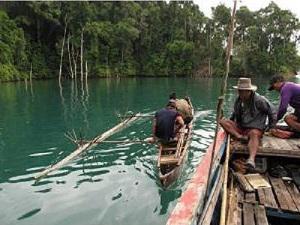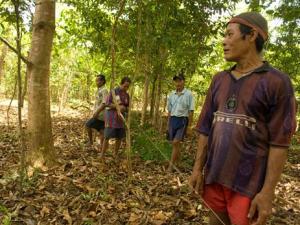Manish Chandi
Other projects
14 Feb 2008
Impacts of the 2004 Tsunami on Traditional Coastal Resource Management by Indigenous Communities in the Nicobar Islands, India
Indigenous Nicobar Islanders have lived primarily along the coast, and used natural resources through systems of traditional ownership and management. The project will provide understanding of drivers of change, as well as a venue for conservation and socio-ecological resilience in the fallout of 2004 tsunami and earthquake, an event of extraordinary proportions that brought a variety of changes in its wake.

The biologically and anthropologically remarkable Nicobar Islands form the focus of my study where I compare the structure of common property resource systems based on social organisation and resource availability across the archipelago. Being one of the most severely affected regions by the tsunami of 2004, there have been dramatic shifts in natural resource availability; rehabilitation measures and attitudinal shifts have also contributed to changes in subjective values attributed to resources that contribute to the local economy and ethnic identity. I propose to document these changes - precipitated by the tsunami and its aftermath - in natural resource availability and values attributed to them to understand the mechanisms of resilience in common property resource management systems. This project aims to understand how livelihoods and social frameworks influence the use of natural resources, as well as the foundation of socio-ecological resilience. By understanding these indigenous systems and modern transitions, I propose to develop appropriate methods to address natural resource conservation and livelihood needs, based on an adaptive framework. This study is expected to contribute to a better understanding of the principles on which traditional resource management systems are founded and how they respond to local and global influences.

Given that socio-ecological stability is dependent on community institutions and self regulation, it is important to understand those factors that determine the strength of community institutions in the Nicobars. Community institutions in the Nicobars are largely based on kin groups/clans, whose primary function is to partition limited resources among resource users on their island. Resource governance has traditionally been the domain of clan elders who regulate resource access both spatially and temporally to maintain the economy and livelihood of their respective groups. These natural resources represent a range of values for sustenance, but additionally have economic and cultural values and may be important in determining wealth or in the conduct of rituals. My work will document the complex values associated with these natural resources, and will identify avenues of self regulation that are sufficiently understood and recognised. This understanding will help to identify ways of revitalising traditional resource management institutions in these island communities. In policy landscape that is dominated by top-down, government-controlled efforts at conservation, this, more community-driven, bottom-up resource management could serve as potentially more equitable and sustainable model of resource management for the region.
